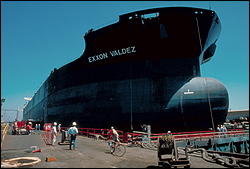The Puget Sound dodged a bullet last week.
On Friday, Oct. 7, the U.S. House of Representatives narrowly voted 212-210 to pass an energy bill stuffed full of pork and favors to big corporations. But at the last moment, an effort by several local lawmakers stripped from the bill a provision that would have eliminated all limits on oil tanker traffic in Puget Sound. It was an invitation for a massive, Exxon Valdez–style oil spill right in our backyard.
The Gasoline for America’s Security Act had passed the Committee on Energy and Commerce the previous week. At that time, U.S. Rep. Jay Inslee, D–Bainbridge Island, who sits on that committee, tried to strip the tanker provision out of the bill. He was unsuccessful on a straight party-line vote. A bipartisan group from the Puget Sound region—Democrats Inslee and Bremerton’s Norm Dicks and Auburn Republican Dave Reichert—began trying to get the provision cut out before the bill went to the floor for a vote.
Refining capacity in Washington state is limited to producing gasoline for use in Washington state. Some 600 tankers a year pass through the Strait of Juan de Fuca—the limit was put in place in 1977 by former U.S. Sen. Warren Magnuson. With the Alaska Pipeline nearing completion, Maggie’s ban was specifically intended as environmental prevention—to keep Puget Sound from being the distribution point for Alaska oil bound for the Lower 48.
As so often happens in the other Washington these days, Magnuson’s limits were imperiled because a big corporation wanted a favor from a Republican Congress. The corporation, in this case, is BP, which is fending off a lawsuit from environmentalists and civics groups. The lawsuit challenges a new pier the oil giant has built at its Cherry Point plant.
An appellate court has decided to review whether the Cherry Point facility violates capacity regulations. The solution—for BP—was not to win the lawsuit but to go to Congress to get the limits repealed. A Texas Republican, Joe Barton, the chair of the Committee on Energy and Commerce, was the lead sponsor of the Gasoline for America’s Security Act. Barton had no problem with putting a brief provision in his bill as a favor to his oil buddies at BP.
The problem was that in short- circuiting the lawsuit against BP, this provision also did much more. With our area being the part of the Lower 48 that’s geographically closest to Alaska, the bill would have potentially opened up the Strait of Juan de Fuca and Puget Sound to thousands of tanker trips annually. Last year, two minor tanker spills on the beaches of Vashon Island showed just how poorly prepared local authorities are to handle them. The state and the Coast Guard were widely criticized for critical delays in responding to one of the spills because of darkness and heavy fog. With the Strait of Juan de Fuca frequently having treacherous weather, for years environmentalists have fought unsuccessfully to require tugboat escorts for tankers. All in all, this one minor favor to BP would have proved costly to taxpayers—clearly, the region would need to vastly improve its preparedness in the case of a massive spill. Of course, the best way to prevent a spill is to prevent the oil from coming here in the first place.
That’s what Magnuson foresaw in 1977, and it’s just as true today. Inslee, Dicks, and Reichert deserve credit for stopping this provision from moving forward. As a bipartisan group of representatives from the affected area, their concern swayed House managers to deny BP their favor—this time.
Otherwise, what you would have had is a Texas Republican bringing oil—lots of it—to the shores of Puget Sound. Joe Barton wanted it. BP wanted it. Nobody bothered to ask the people who actually live here whether we wanted it.







